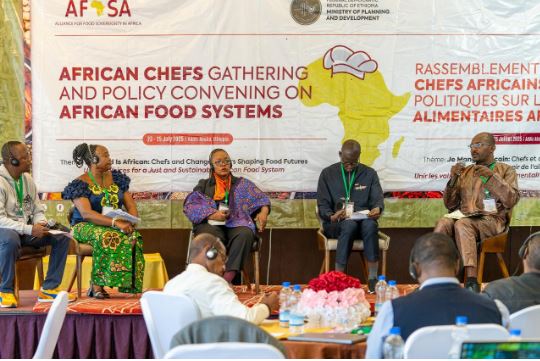Mussa Juma, Addis Ababa, Ethiopia
The Tanzanian government has been praised as one of the few countries in Africa, adopting a national strategy to identify and protect indigenous seeds to ensure food security.
Minister of Agriculture, Mr. Hussein Bashe in the season of 2024/25, has approved the registration of the use of 13 indigenous seeds of various crops to be used by farmers in accordance with the Tanzanian seed law, Chapter 308 section 12@ and 13 (3).
Speaking at the opening of the conference to discuss the policies governing the African Food Systems, the Chief Coordinator of the International Association for the African Freedom of Food (Afsa) Dr. Million Belay and former Chairman of the East African Parliamentary Committee (EALA) on Agriculture, Tourism and Natural Resources, Mr. Francoise Uwumukiza, said the move by Tanzania and the Kenyan government to recognize the natural seeds should be intended by other nations.
Dr. Belay said that in order for the African continent to have food security it is very important to develop and protect natural seeds rather than relying on seeds of various crops from outside Africa.
“The African continent for the past was the main producers of food, due to the presence of natural knowledge in agriculture, but it has now turned the continent to rely on everything from outside Africa in the presence of crop seeds”, he said.
Dr.Belay said due to climate change in the world and protecting soil health, food security and the African continent should protect and use its natural seeds and develop ecological agriculture.
EALA MP, Mr. Uwumukiza said the East African Community, recognizes the importance of indigenous seeds and supports efforts by the governments of Tanzania and Kenya to start recognizing the seeds by registering them.
He said the recognition of the seeds was the implementation of the leaders of the African Union, in protecting Africa’s food security.
“EALA we will continue to draft policies and laws to protect indigenous seeds but we urge other countries in Africa to identify indigenous seeds and start protecting them”, he said
Minister of Planning and Development of Ethiopia, Mrs. Fitsum Assefa Adela said the issue of food safety in Africa is important to continue to be discussed and put in place permanent strategies.
“The Ethiopian government recognizes the importance of food safety for health protection and food consumers but to protect themselves from hunger”, he said
Sida Africa Project Manager, Mr. Ayele Kebede Gebreyes said the organization in collaboration with other countries will continue to support projects to ensure the African continent has food security.
Commenting on the Tanzanian government’s approval to approve the use of indigenous seeds, the Tanzania Farmers Federation (Shiwakuta) Project Officer who is also the Project Officer of the Arusha Farmers Groups (MVIWAHASA) Damian James Sulumo said they are grateful to the Government for the identification of the native seeds.
“It was no small task the government to reach this decision, we formed a seed task force and negotiated with the government and the Parliamentary Committee on Agriculture until the agreement was a great comfort to us” he said.
Mr. Sulumo said the Ministry of Agriculture, also in the 2005/26 budget discussed the importance of natural seeds and promised to continue further studies including the construction of a special research center in Arusha.
Shiwakuta’s influence and advocacy officer, Mr. Thomas Laizer said it is impossible to have an agricultural revolution based on seed from outside Africa and to mention the native seeds approved in Tanzania are four (4) types of maize seeds, rice 4 species, two (2) bean seeds and three (3) papaya.
“In Tanzania we have been given a lot of natural and natural seeds that we believe if used properly we will increase food production but there will also be food security at all times and stop relying on seed from abroad at all times,” he said.
The food security conference is underway in the city of Addis Ababa where 23 countries in Africa are participating, including crop researchers, ecological agricultural experts (living) legislators, government officials, civil society and journalists.




